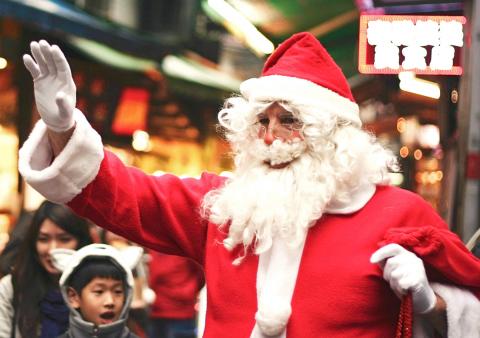The road to recovery has been slow for the Aboriginal residents of Wulai (烏來) in New Taipei City, many of whom have been affected by the typhoons earlier this year. But this Sunday, Santa will be spreading some holiday cheer to the town’s youngest residents, handing out toys and donated school supplies, as well as leading a group of pint-sized carolers.
The idea behind “Christmas in Wulai” started in 2011 with long-time Taipei expat Gary Smoke. As a Vietnam War veteran, Smoke says he’s seen what people are capable of doing to each other and wanted to contribute something meaningful to the community he was living in for a change. At the time, Smoke was also collecting instructional books recycled by English teachers in Taiwan who left their jobs when he met Tony Coolidge (he’s also a contributor for the Taipei Times). Coolidge was born in Wulai to an Atayal Aboriginal mother and American serviceman father and had just returned to Taiwan to rediscover his roots. Like Smoke, Coolidge also felt compelled to give back to the community.
“I said, ‘hey, why don’t we put on a Christmas show up in Wulai?’” Smoke says. “The rest is history.”

Photo courtesy of Maciej Korbas
Smoke now serves as the international relations director at Coolidge’s Taiwan-based non-profit organization, Atayal, which aims to connect indigenous people around the world. In the past, they’ve arranged for musicians, storytellers and children’s choirs from nearby churches to perform outside of Wulai Atayal Museum, and this year’s event will be just as boisterous.
“I’ll walk down the streets in my Santa suit handing out candy and people will stop and hand me their babies, asking me to pose so that they can get a picture of Santa with their baby,” Smoke tells me.
Santa and his helpers will hand out Christmas bells and clappers to children, encouraging them to dance. Although some might initially be too shy to join in, most eventually come around.
“Once people know Santa is here, the crowd is just in frenzy mode,” Smoke adds.
Besides organizing the yearly Christmas event, Smoke is trying to implement new programs in Wulai that will have more long-lasting change. One idea is to do a walking tour of Wulai led by a local Atayal guide and accompanied by an English translator. Another is to develop the library in the museum by donating his English textbooks and converting the place into a learning center. Finally, Smoke also wishes to start a soccer tournament in Wulai that will bring together Atayal children and students from international schools.
Smoke says that all the projects are intertwined and have to do with children of different backgrounds coming together and learning from one another. In particular, the idea to host soccer tournaments came from the English-language basketball camps Coolidge had been organizing for children in Tainan.
“Our expectations are high and it’s all contingent on collaborating with Wulai’s Atayal community,” Smoke says.

On April 26, The Lancet published a letter from two doctors at Taichung-based China Medical University Hospital (CMUH) warning that “Taiwan’s Health Care System is on the Brink of Collapse.” The authors said that “Years of policy inaction and mismanagement of resources have led to the National Health Insurance system operating under unsustainable conditions.” The pushback was immediate. Errors in the paper were quickly identified and publicized, to discredit the authors (the hospital apologized). CNA reported that CMUH said the letter described Taiwan in 2021 as having 62 nurses per 10,000 people, when the correct number was 78 nurses per 10,000

As we live longer, our risk of cognitive impairment is increasing. How can we delay the onset of symptoms? Do we have to give up every indulgence or can small changes make a difference? We asked neurologists for tips on how to keep our brains healthy for life. TAKE CARE OF YOUR HEALTH “All of the sensible things that apply to bodily health apply to brain health,” says Suzanne O’Sullivan, a consultant in neurology at the National Hospital for Neurology and Neurosurgery in London, and the author of The Age of Diagnosis. “When you’re 20, you can get away with absolute

May 5 to May 11 What started out as friction between Taiwanese students at Taichung First High School and a Japanese head cook escalated dramatically over the first two weeks of May 1927. It began on April 30 when the cook’s wife knew that lotus starch used in that night’s dinner had rat feces in it, but failed to inform staff until the meal was already prepared. The students believed that her silence was intentional, and filed a complaint. The school’s Japanese administrators sided with the cook’s family, dismissing the students as troublemakers and clamping down on their freedoms — with

As Donald Trump’s executive order in March led to the shuttering of Voice of America (VOA) — the global broadcaster whose roots date back to the fight against Nazi propaganda — he quickly attracted support from figures not used to aligning themselves with any US administration. Trump had ordered the US Agency for Global Media, the federal agency that funds VOA and other groups promoting independent journalism overseas, to be “eliminated to the maximum extent consistent with applicable law.” The decision suddenly halted programming in 49 languages to more than 425 million people. In Moscow, Margarita Simonyan, the hardline editor-in-chief of the